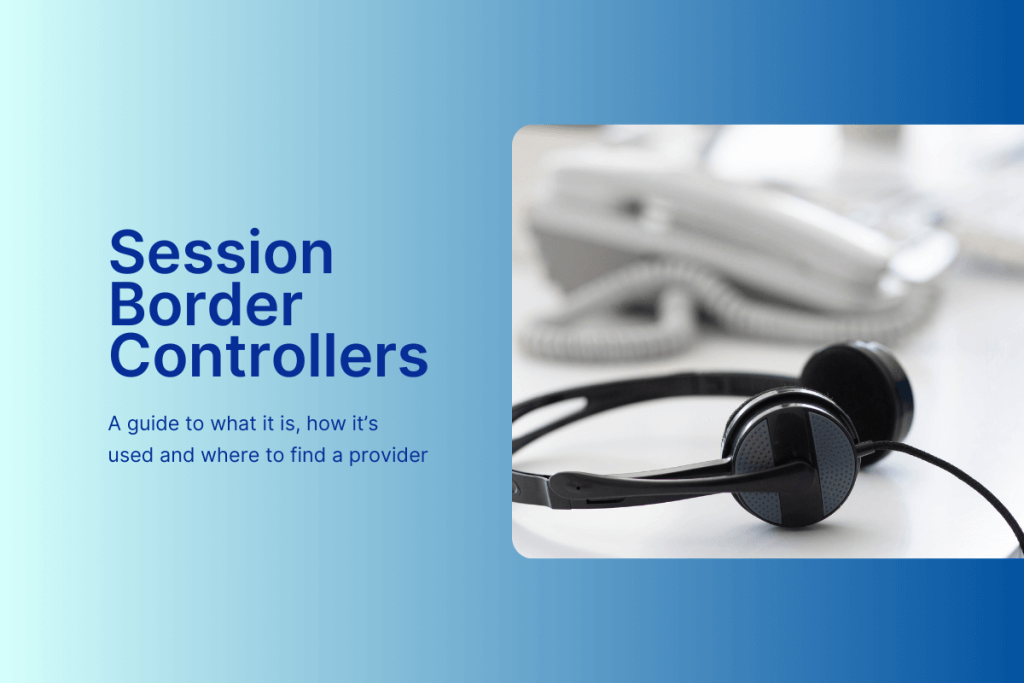What is a Session-Border-Controller (SBCaaS)?
Session Border Controller as a Service (SBCaaS) is a cloud-based tool that helps businesses control their communication networks, especially for voice calls over the internet, like VoIP (Voice over Internet Protocol). In the past, companies used physical devices called Session Border Controllers (SBCs), but now with cloud technology, many are switching to virtual versions for more flexibility and security.
SBCaaS allows organizations to secure their calls, prevent cyberattacks, and ensure smooth communication between different systems. It is especially useful for large companies that need to manage many phone calls or data exchanges over the internet, making sure these are safe and efficient. As cloud solutions are set to generate over $3 trillion in value by 2030 across industries, including telecommunications, the role of SBCaaS is becoming more critical. (Source: McKinsey).
Core Functions of Session Border Controllers
Now that we’ve answered the question of “What is a Session-Border-Controller (SBCaaS)?”, what does it do?
An SBC serves as a “gatekeeper” for communications that happen over the internet. This means it protects, monitors, and controls the flow of information to ensure everything is working properly. With SBCaaS, the core functions are:
- Security: The SBC prevents issues like Denial-of-Service (DoS) attacks, where hackers try to overload systems and cause disruptions. It also ensures calls are private and protected from eavesdropping.
- Interoperability: SBCs help different systems “talk” to each other smoothly. For example, if a company uses multiple VoIP providers, the SBC ensures these systems can work together.
- Traffic Management: It controls the flow of voice and data traffic to prevent delays or drops in call quality, making sure users have a smooth experience.
Because SBCaaS is cloud-based, businesses don’t need to buy expensive hardware and can easily scale up or down depending on their needs.
Why Virtual Session Border Controllers are Important
Today, as more companies move their operations to the cloud, virtual session border controllers (SBCs) have become essential. A virtual SBC does everything a traditional SBC does but without the physical hardware, allowing companies to save money and adapt more quickly to changes.
With virtual SBCs, companies can:
- Scale on-demand: This means they can adjust their communication capabilities as their business grows.
- Integrate seamlessly: Virtual SBCs fit well with existing cloud services and telecom solutions.
- Improve security: They offer built-in protection from internet threats, which is crucial for businesses relying on VoIP systems.
According to Gartner, companies using virtual SBCs have increased by 40% in recent years due to the benefits of cloud-based communications (Source: Gartner).
Use Cases and Benefits of SBCaaS
SBCaaS is especially helpful for businesses that need to manage large-scale communication systems. It’s commonly used in industries like telecommunications, finance, healthcare, and government services—areas where secure and reliable communication is critical.
Here are some of the main benefits of SBCaaS:
- Cost Efficiency: Since it’s cloud-based, businesses don’t need to spend money on buying and maintaining hardware. According to McKinsey, using cloud-based services like SBCaaS can lower operational costs by up to 25% (Source: McKinsey).
- Flexibility and Scalability: SBCaaS allows companies to easily increase or decrease their communication capacity as needed.
- Enhanced Security: Virtual SBCs offer high levels of encryption, keeping sensitive information safe during communications.
Case Study: A large telecom company used SBCaaS to replace its old hardware system. After the switch, the company saw a 30% increase in system uptime and a 15% drop in security breaches within the first year (Source: McKinsey).
SBC in Telecommunications
The telecommunications industry heavily relies on SBCs to ensure smooth and secure communication. With the rise of SIP trunking (a technology that allows phone systems to operate over the internet) and VoIP, SBCs help telecom companies manage massive amounts of voice and video traffic, making sure everything runs efficiently.
The SBC telecommunications market is growing fast, thanks to the increasing demand for cloud-based communication. According to Statista, the global SBC market is expected to grow by 12% each year, reaching $2.1 billion by 2027 (Source: Statista).
SBCaaS vs. Traditional SBCs
While traditional SBCs require physical equipment and regular maintenance, SBCaaS eliminates these costs and offers greater flexibility. The main advantages of SBCaaS include:
- Cost Savings: With no need for hardware, businesses can save money upfront. A report from Gartner found that 60% of companies prefer cloud-based SBCs due to their cost-efficiency (Source: Gartner).
- Scalability: SBCaaS allows businesses to adjust their communication systems based on their current needs.
- Easier Integration: Cloud-based SBCs fit seamlessly with existing telecom systems.
Session Border Controller Vendors
Several companies provide SBCaaS solutions, but few are able to offer it in far-reaching global locations as ULAP does (learn more about it here). While other vendors may focus on more centralized markets, ULAP stands out by delivering SBCaaS to remote and underserved regions, ensuring businesses in these areas have access to the same level of secure and scalable communications as their counterparts in major hubs.
Other key SBCaaS vendors include:
•Ribbon Communications: Known for their innovative virtual SBCs, Ribbon is a leader in cloud communications.
•Oracle: Oracle offers robust SBCaaS solutions designed for large enterprises and service providers.
•AudioCodes: This company offers SBCs that work well with popular platforms like Microsoft Teams and Zoom.
Case Study: A global financial services company partnered with Ribbon Communications to roll out SBCaaS across its offices worldwide. This change improved call quality and reduced downtime by 20% (Source: Forbes).
Conclusion and Future Trends
SBCaaS is becoming a must-have for businesses that want to stay ahead in the digital world. As companies adopt more SIP and VoIP technologies, having a secure and scalable communication system like SBCaaS will become increasingly important.
Future Trends:
- AI and Automation: Many companies are adding AI to their SBCaaS solutions for real-time monitoring and better performance.
- Increased Security: As cyber threats grow, SBCaaS providers will continue developing advanced security features to keep communications safe.
According to Forrester, 70% of companies are planning to fully switch to virtual SBCs in the next five years (Source: Forrester).
SBCaaS is set to lead the way in modern telecommunications, giving businesses the tools they need to secure their communications and operate more efficiently.






